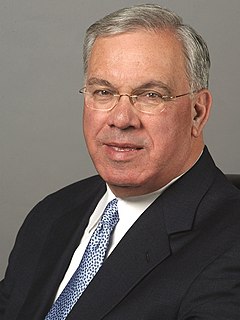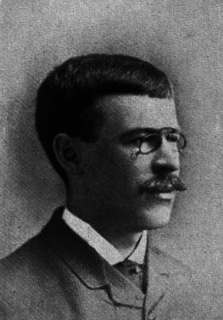
The mayor of Boston is the head of the municipal government in Boston, Massachusetts. Boston has a mayor-council system of government. Boston's mayoral elections are non-partisan, and elect a mayor to a four-year term; there are no term limits. The mayor's office is in Boston City Hall, in Government Center.

Proposition 2+1⁄2 is a Massachusetts statute that limits property tax assessments and, secondarily, automobile excise tax levies by Massachusetts municipalities. The name of the initiative refers to the 2.5% ceiling on total property taxes annually as well as the 2.5% limit on property tax increases. It was passed by ballot measure, specifically called an initiative petition within Massachusetts state law for any form of referendum voting, in 1980 and went into effect in 1982. The effort to enact the proposition was led by the anti-tax group Citizens for Limited Taxation. It is similar to other "tax revolt" measures passed around the same time in other parts of the United States. This particular proposition followed the movements of states such as California.

Thomas Michael Menino was an American politician who served as the 53rd mayor of Boston, Massachusetts from 1993 to 2014. He was the city's longest-serving mayor. Before becoming mayor, the Boston native was a member and President of the Boston City Council.
Sick leave is paid time off from work that workers can use to stay home to address their health needs without losing pay. It differs from paid vacation time or time off work to deal with personal matters, because sick leave is intended for health-related purposes. Sick leave can include a mental health day and taking time away from work to go to a scheduled doctor's appointment. Some policies also allow paid sick time to be used to care for sick family members, or to address health and safety needs related to domestic violence or sexual assault. Menstrual leave is another type of time off work for a health-related reason, but it is not always paid.

The Massachusetts general election, 2010 was held on November 2, 2010 throughout Massachusetts. Primary elections took place on September 14, 2010.

The Massachusetts English Language Education in Public Schools Initiative, Question 2 was a successful initiative voted on in the Massachusetts general election held on November 5, 2002. It was one of three 2002 ballot measures put to public vote, and the only one to pass.

A Massachusetts general election was held on November 5, 2002 in the Commonwealth of Massachusetts.

John Robert Murphy was a Massachusetts politician and attorney who served as the Commissioner of the Boston Fire Department, Chairman of the Boston Finance Commission and in both branches of the Massachusetts legislature.

Althea Garrison is an independent American politician from Boston, Massachusetts, who has served on the Boston City Council as an at-large councilor.

Daniel A. Wolf is an American entrepreneur, aircraft pilot, and politician. In 1989, he founded the Cape Cod-based airline Cape Air, which originally flew between Provincetown and Boston in Massachusetts, and has since expanded internationally. In 2010, he was elected to the Massachusetts Senate to represent the Cape and Islands district. He ran unopposed in 2012, and was subsequently re-elected to a third term in 2014. During his tenure, he has emerged as a progressive leader in the Senate, advocating for renewable energy, increased minimum wage, and universal health care.

The Massachusetts Charter School Expansion Initiative, Question 2 was an unsuccessful initiative voted on in the Massachusetts general election held on November 8, 2016. It was one of four 2016 ballot measures put to public vote.

The Massachusetts Expand Slot Machine Gaming Initiative was a 2016 Massachusetts ballot measure. Also known as Question 1, it was an indirect initiated state statute question that would allow the Massachusetts Gaming Commission to issue an additional license for another slot machine parlor to exist in the state. The ballot question specified that the additional slots parlor be licensed only on a property within 1,500 feet (460 m) of a racetrack and built on a parcel that is at least 4 acres (1.6 ha) in size. The only location in the state where this would have applied was Suffolk Downs in East Boston.

The Massachusetts Gender Identity Anti-Discrimination Initiative is a state-wide referendum passed by Massachusetts voters in the 6 November 2018 mid-term election that prohibits discrimination in public accommodations on the basis of gender identity. The vote upholds language which was already present in the state anti-discrimination statute, defeating an attempt to veto it by public referendum. It is the first state-wide anti-discrimination statute passed by referendum supporting transgender rights in the United States.

The Massachusetts Expansion of Bottle Deposits Initiative, Question 2 was an unsuccessful initiative voted on in the Massachusetts general election held on November 4, 2014. It was one of four 2014 ballot measures put to public vote.

The Massachusetts Casino Repeal Initiative was an unsuccessful initiative voted on in the Massachusetts general election held on November 4, 2014. It was one of four 2014 ballot measures put to public vote.

Three ballot measures were certified for the November 6, 2018, general election in the state of Massachusetts.

The Boston mayoral election of 1905 occurred on Tuesday, December 12, 1905. Democratic candidate John F. Fitzgerald defeated Republican candidate Louis A. Frothingham, and four other contenders, to win his first term as Mayor of Boston. Primary elections had been held on Thursday, November 16, 1905.

The 2020 Massachusetts general election was held on November 3, 2020, throughout Massachusetts. Primary elections were held on September 1, 2020.

Massachusetts Ranked-Choice Voting Initiative, also known as Question 2, was an initiative at the 2020 Massachusetts general election that would have changed primaries and elections in Massachusetts from plurality voting to ranked-choice voting (RCV) for all Massachusetts statewide offices, state legislative offices, federal congressional offices, and certain other offices beginning in 2022. RCV would not be extended to elections for president, county commissioner, or regional district school committee member. The initiative failed, with 54.8% of voters voting 'No' and 45.2% 'Yes'.

The Massachusetts Right to Repair Initiative (2020), also known as Question 1, appeared on the Massachusetts 2020 general election ballot as an initiated state statute. It was approved by voters and the measure will update the state's right to repair laws to include electronic vehicle data. A similar Right to repair initiative appeared on the 2012 state ballot and passed with 86% of the vote.







